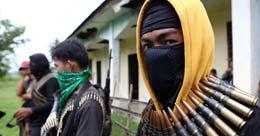ISIS targets Southeast Asia

Recent developments concerning Islamic State (IS) across Asia suggest the group have recruited locally and were likely to carry out a major strike, according to Alex Bomberg, group chief of Intelligent Protection International, part of Intelligent (UK Holdings).
IS had developed localised organisations and operations in Southeast Asia and was active in the Philippines, Indonesia, Malaysia and Bangladesh. In addition, fighters recruited from Asia to fight in Syria and Iraq were starting to return home, as the extremists’ war in the Middle East was facing defeat.
“I think they are ready to do something in Asia. I think it’s going to happen very soon,” Bomberg said, according to a report by the South China Morning Post.
Last week the United States warned of possible summer terrorist attacks in Europe, saying targets could include the European soccer championship in France or the Catholic Church’s World Youth Day events, based on an accumulation of information.
Raffaello Pantucci, a researcher at the Royal United Services Institute in London, said he wouldn’t be surprised “if we saw an attack somewhere in Southeast Asia that is seen as being inspired, linked or maybe even directed by IS”.
Bomberg said an attack would likely target tourist hotspots and be paired with a strike on infrastructure such as a subway or airport.
To maximise damage and casualties, IS had adopted an “active shooter” tactic, where multiple gunmen simultaneously open fire with automatic weapons and quickly move from one location to the next, as was seen in Paris in November, he said.
“They are not going to waste opportunities,” he said. “They are going to want it to be spectacular.”
His company, which provides protection services to British royals and high net worth individuals, urged Asian countries to improve information sharing and be more open with the public.
Don’t allow Islamic State to gain ground in Southeast Asia
If there were an attack in Hong Kong, it would be a “strike at the heart of the dragon”, according to Bomberg.
But given a lack of support for terrorist groups in the financial city, Hong Kong was at less of an immediate risk than were Indonesia, Malaysia or the Philippines, said Pantucci.
Li Lifan, a researcher at the Shanghai Academy of Social Sciences, said airports authorities in Hong Kong and Beijing were effective in using biometric information shared by the international community to screen out dangerous people upon entry.
Mainland China had also become vigilant and awareness about terrorism in the country was high, Li said.
According to a new report from Singaporean officials, ISIS is significantly out-recruiting al-Qaeda in Southeast Asia, warning that ISIS has sent more than 1,000 recruits from the region to Iraq and Syria in recent years.
The warnings from Singapore Defence Minister Ng Eng strongly mirrors the problems faced by Europe with its own ISIS recruits, saying that ISIS militants who went abroad to fight are returning with strong ideological links to ISIS.
With the numbers aren’t as glaring as those in Europe, the danger is that, as returnees from Iraq and Syria come back to the region, they could recruit more locals and launch major attacks in the region, much as has happened with returnees in Europe.
Ng made the comments at a regional security forum, which was discussing in part the rise of international Islamic terrorism as a problem across Southeast Asia.
Ms Nur Diyanah Anwar, a research analyst at the S Rajaratnam School of International Studies’ (RSIS) Centre of Excellence for National Security, noted the recent surge of propaganda materials from Isis that was translated into regional languages such as Malay and Bahasa Indonesia.
“It is clear that Isis is placing great focus on South-east Asia,” she said.
ISIS Videos centered on children are a timely reminder that Isis runs a “multigenerational campaign” that targets everyone in society, including children and women, said Professor Rohan Gunaratna, who heads the RSIS International Centre for Political Violence and Terrorism Research.
National University of Singapore political scientist Bilveer Singh said the act of burning passports was symbolic of Isis followers severing ties with their home countries.
“(The scene in the ISIS video) shows to the world that Isis supporters were defiantly abandoning their home state for the Islamic State. It is a public act of disavowal,” he said.






